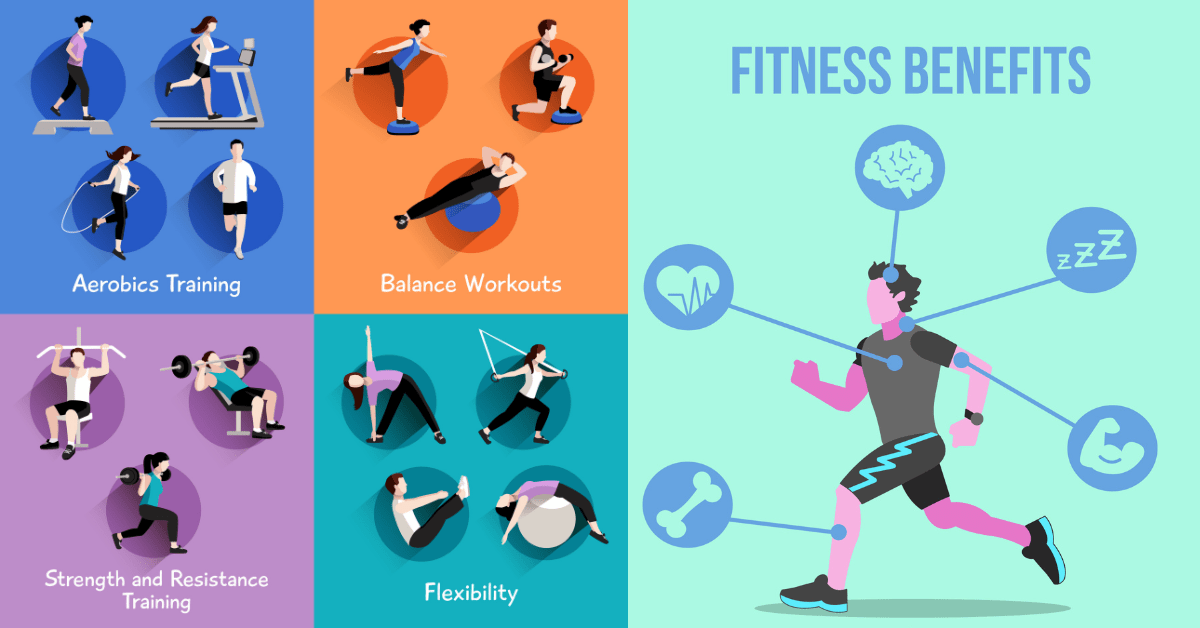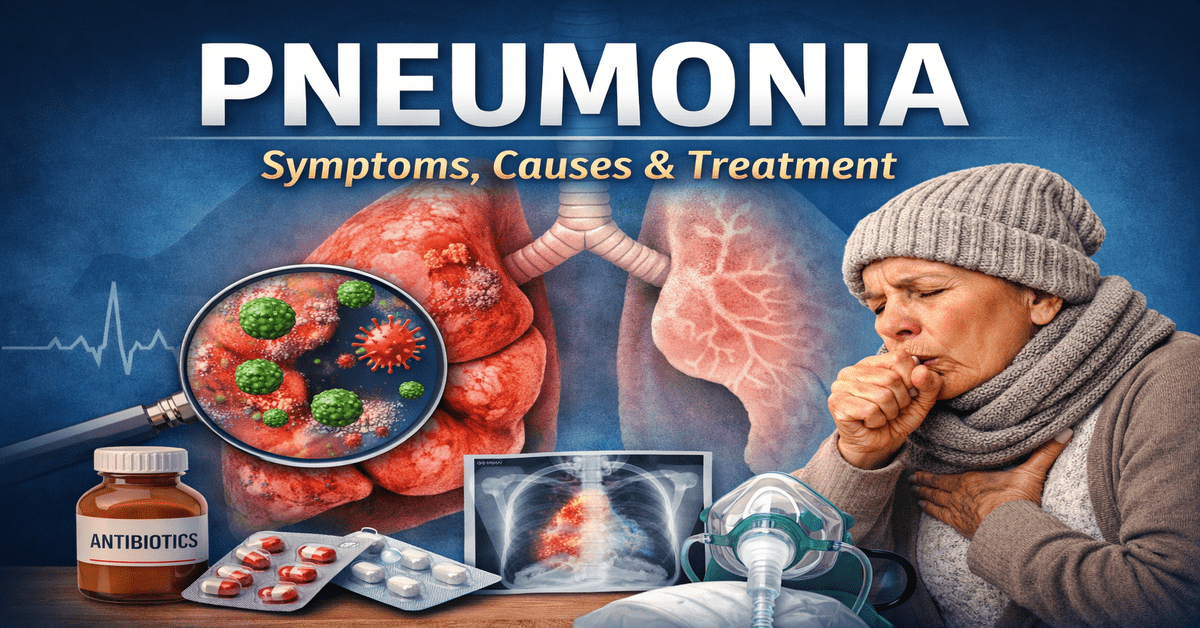The five main components of physical fitness are cardiovascular endurance, muscular strength, muscular endurance, flexibility and body composition.
To stay in excellent health, our body requires physical training. Therefore, you must first devise an appropriate plan for being fit before beginning an exercise regimen. So In this blog we will discuss each component of physical health, how they will benefit us and what are the activities and training tips for them.

Cardiovascular Endurance
Cardiovascular endurance comprises how well our lungs and heart supply oxygen-rich blood to our muscles when we are performing any strenuous task. It is, in essence, an indicator of how well your body can carry out tasks involving aerobic metabolism.
Cardiorespiratory endurance is widely recognized as a crucial component of physical fitness. The heart, lungs, blood vessels and other cardiorespiratory systems are often quite functional in people with high levels of cardiorespiratory endurance and their skeletal muscles are well-suited to using oxygen in aerobic metabolism.
Benefits
- It may alleviate depressive and anxious sensations, enhance focus and memory
- By strengthening bones, enhancing flexibility and agility, preventing weight gain and enhancing sleep, exercise can help you stay active.
- Pumps blood in your body so it reaches in each vein and organ
- Better regulation of blood pressure and cholesterol levels
- decrease your risk of developing serious illnesses such as diabetes, heart disease, stroke, and some types of cancer, such as lung cancer
Activities
To improve cardiovascular endurance, engage in activities such as:
- Run for 1Km or 2Km daily
- Walking on treadmill for atleast 15 mins
- Cycling
- Rowing
- Aerobic exercises (e.g., Zumba, step aerobics)
Tips for Improvement
- Start with moderate-intensity exercises and gradually increase the duration and intensity.
- Aim for at least 150 minutes of moderate aerobic activity or 75 minutes of vigorous activity per week.
- Incorporate interval training to boost cardiovascular endurance.
- Stay consistent with your workouts and progressively challenge yourself.
Muscular Strength
Muscular strength and endurance are indeed crucial for everyday activities and overall physical health. Strength is the maximum force your muscles can exert, like lifting a heavy object or a kind of powerful movement.

Benefits
- Increased muscle mass and strength
- Enhanced metabolic rate
- Improved posture and bone density
- Reduced risk of injuries and chronic diseases
- Better performance in sports and physical activities
Exercises
To build muscular strength, include exercises such as:
- Weightlifting like bench press, deadlifts & squats
- Resistance band exercises like tricep press, seated calf press, bicep curl & leg press
- Bodyweight exercises like push-ups, pull-ups & planks
- Heavy gardening like digging, watering plants & hoeing
Training Tips
- Use proper form to prevent injuries and maximize effectiveness.
- Progressive overload can be incorporated into your workouts by using a tougher resistance band or adding more weight to increase resistance.
- Rest allows your body to adjust to your training and get stronger and more fit, so if you miss the recovery phase, you won’t be as prepared to get the most out of your next session.
- Focus on compound movements that work multiple muscle groups like push ups, barbell deadlift, lunges, dumbbell shoulder press, planks, chin ups etc.
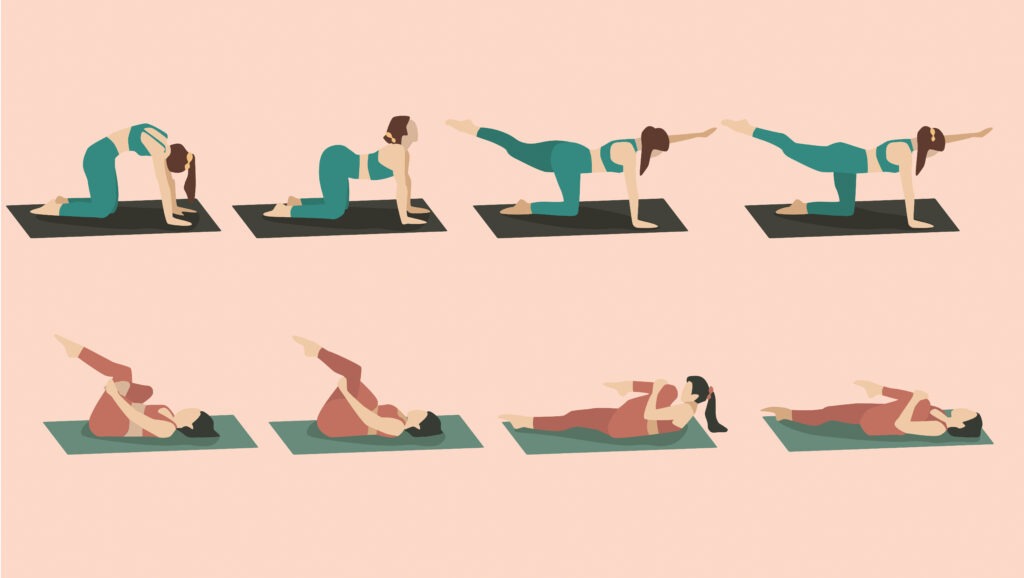
Muscular Endurance
Muscular endurance can be seen as the steadfast ability of muscles to persistently exert force against resistance, enduring through repeated contractions over an extended duration. This capability is fundamental in numerous athletic disciplines where sustained performance is key, be it in endurance sports like long-distance running and cycling, or dynamic activities such as soccer and basketball that demand consistent physical effort.
Benefits
- Improved muscle tone and definition
- Enhanced stamina and endurance
- Better performance in sports and physical activities
- Increased ability to perform daily tasks
- Reduced risk of muscle fatigue and injuries
Exercises
To enhance muscular endurance, try activities like:
- Planks and other core exercises like side plank, knee plank & plank jack
- Road biking and spinning both engage the same muscles. The flywheel’s weight of 14–18 kg, however, increases the amount of pedal strokes per minute, putting more strain on the knees.
- Rowing workouts like bent over row, dumbbell row & inverted row
- Bodyweight exercises with high repetitions like crossfit, pull ups & push ups
- Circuit training exercises like push ups, sit ups, chin ups and lunges
Improvement Strategies
- Incorporate high-repetition, low-weight exercises into your routine.
- Gradually increase the number of repetitions and sets.
- Reduce rest intervals between sets to build endurance.
- Combine strength training with aerobic exercises for overall endurance.
Flexibility
Flexibility is often described as the degree of movement achievable by muscles and connective tissues around a joint or a group of joints. Unlike broader aspects of physical fitness that apply systemically, flexibility is uniquely tailored to each joint in the body, making it a distinctly specific aspect of overall fitness.
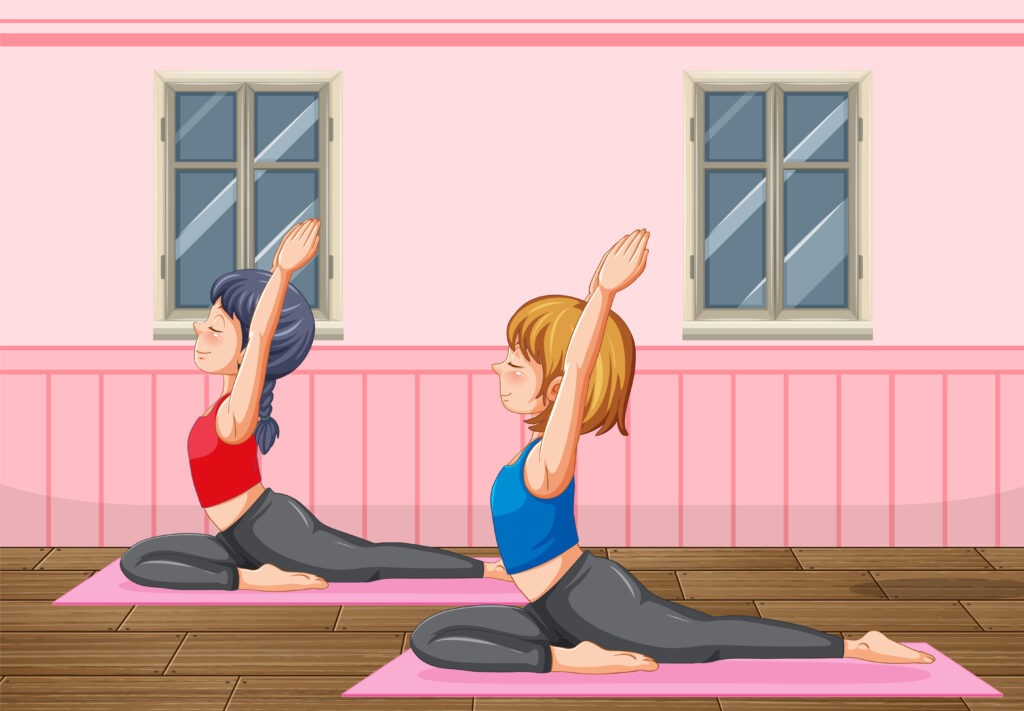
Benefits
- Reduced muscle tension and soreness
- Improved posture and alignment
- Greater range of motion in joints
- Enhanced athletic performance
- Lower risk of injuries
Exercises
To improve flexibility, incorporate exercises such as:
- Yoga
- Static stretching like hamstring stretch, calf stretch
- Dynamic stretching like leg swings, arm circles
- Pilates
- Tai Chi
Tips for Improvement
- Stretch all major muscle groups at least 2-3 times a week.
- Hold each stretch for 15-30 seconds and repeat 2-4 times.
- Warm up before stretching to prevent injuries.
- Breathe deeply and avoid bouncing during stretches.
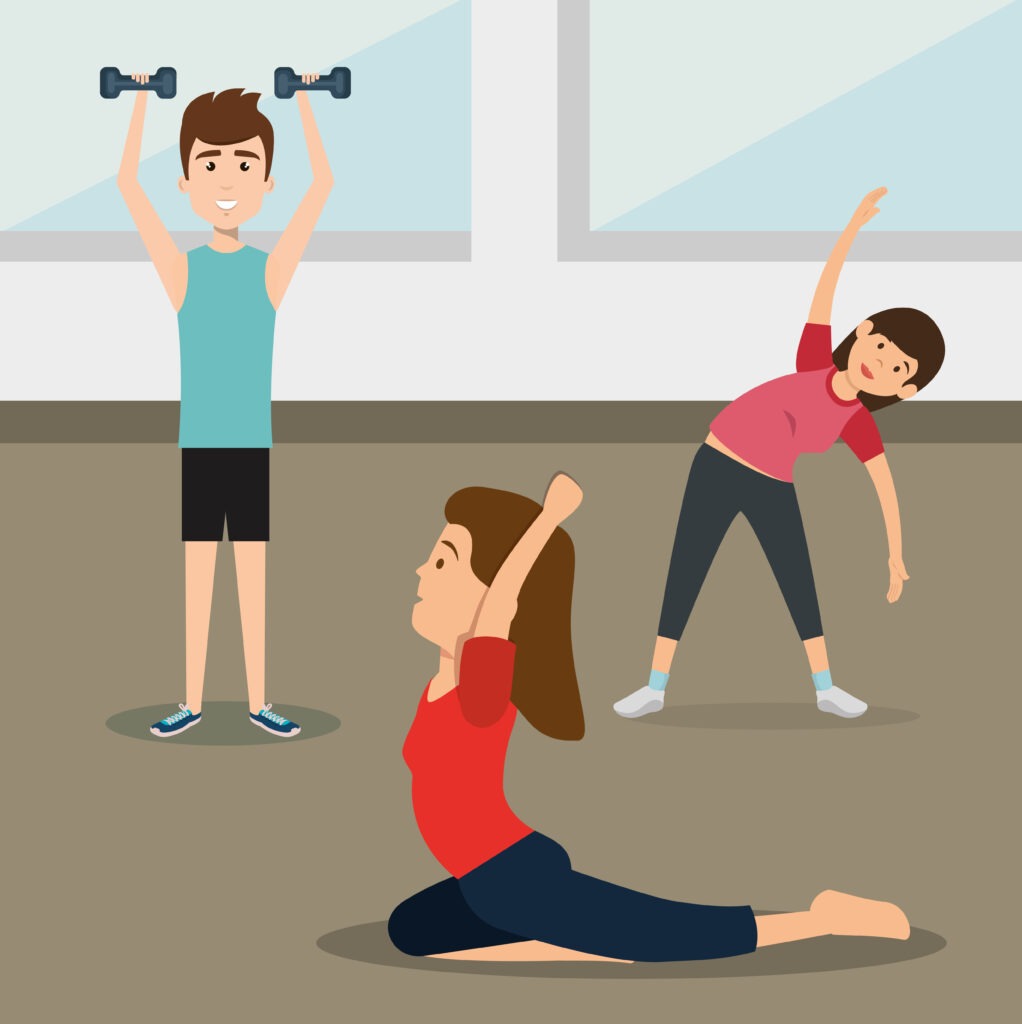
Body Composition
Body composition refers to the ratio of fat to lean mass in the body, including muscles, bones, and organs. Maintaining a healthy body composition is vital for overall health and reducing the risk of chronic diseases.
Benefits
- Reduced risk of obesity and related diseases
- Improved physical appearance and self-esteem
- Enhanced metabolic health
- Better athletic performance
- Increased longevity and quality of life
Measurement Methods
Assess body composition using methods such as:
- Body Mass Index (BMI)
- Skinfold measurements
- Bioelectrical impedance analysis (BIA)
- Dual-energy X-ray absorptiometry (DEXA)
- Hydrostatic weighing
Improvement Tips
- Combine regular physical activity with a balanced diet.
- Focus on strength training to increase lean muscle mass.
- Incorporate cardiovascular exercises to reduce body fat.
- Monitor progress with regular body composition assessments.
Balanced Fitness Routine
To achieve overall physical fitness, it is important to create a balanced routine that includes exercises targeting all five components. This ensures a comprehensive approach to health and well-being.
Sample Workout Plan
Here’s a sample weekly workout plan that incorporates all five components:
- Monday: Cardiovascular Endurance like 30 minutes of running
- Tuesday: Muscular Strength like weightlifting session
- Wednesday: Flexibility like yoga class
- Thursday: Muscular Endurance like circuit training
- Friday: Cardiovascular Endurance like swimming
- Saturday: Body Composition focus like mixed workout with cardio and strength training
- Sunday: Rest or light activity (e.g., walking, stretching)
The Bottom Line
In conclusion, sustaining a healthy and balanced lifestyle requires an understanding of and attention to the five elements of physical fitness: flexibility, muscular strength, muscular endurance, cardiovascular endurance, and body composition. You can raise your quality of life, avoid injuries, and increase your general fitness by including activities that focus on each of these areas. Determine your current level of fitness and design a thorough exercise program that meets your requirements and objectives.
Prateek Raj is an fitness coach based in the US, dedicated to helping individuals achieve their health and wellness goals. With a background in sports science and nutrition, Prateek empowers his clients through personalized training programs and expert guidance. His holistic approach focuses on strength, endurance, and mental resilience for sustainable results.

